CALL FOR APPLICATIONS: MECAM-Long-Term Fellowships 2023-2026
The Merian Centre for Advanced Studies in the Maghreb (MECAM) invites applications for three long-term fellowships for postdoctoral researchers in the humanities and social sciences for the period from 01 September 2023 to 31 August 2026. Under the overall theme “Imagining Futures: Dealing with Disparity” MECAM is dedicated to a research agenda framed by five interrelated ‘Interdisciplinary Research Fields’ (IRFs): Aesthetics & Cultural Practice, Inequality & Mobility, Memory & Justice, Resources & Sustainability, and Identities & Beliefs. Applications should be related to at least one of the IRFs. This call for applications is open to researchers from all countries, including Tunisia. MECAM has been established at the Université de Tunis/Tunisia in October 2020 to strengthen internationalization, free academic research and cooperation in the Humanities and Social Sciences in, with and across the Maghreb, and other regions of the world.
Deadline: 31.05.2023; 12.30h CEST.
The Merian Centre for Advanced Studies in the Maghreb (MECAM), based in Tunis, is a new institutional framework for interdisciplinary, interregional, and intergenerational research. As a centre for Advanced Study, it is dedicated to free academic exchange with a focus the social and political processes and issues that divide and connect the Maghreb, the Middle East and Europe historically and in our time – e.g. beliefs, distribution of resources, migration, rule of law, socio-economic conflicts, and (transitional) justice. MECAM aims to construct and strengthen scholarly networks between Tunisia and Germany, across the Maghreb, the Middle East, Europe, and other regions of the world. From a vantage point in the Maghreb, MECAM’s guiding theme “Imagining Futures: Dealing with Disparity” addresses the complex processes of (re-) negotiating societal experiences into ideas for the future (‘imagining futures’) within the context of different forms and scales of disparity and unequal conditions (‘disparity’). It explores the connection between multidimensional disparity and the possibilities of building and negotiating futures through five thematic interdisciplinary research fields (IRFs): “Aesthetics & Cultural Practice”, “Inequality & Mobility”, “Memory & Justice”, “Resources & Sustainability”, and “Identities & Beliefs”.
With this call for applications, MECAM invites postdoc scholars in the social sciences and humanities to apply for long-term fellowships with their own research projects that relate to one or more of MECAM’s Interdisciplinary Research Fields (IRFs) under the guiding theme of “Imagining Futures: Dealing with Disparities”:
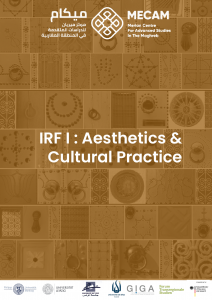
IRF « Aesthetics & Cultural Practices »
Examines how aesthetic forms and cultural practices influence the process by which models and imaginations of the future are expressed and (re-)negotiated. It also investigates the ways in which disparities, political and societal transformations influence aesthetic and cultural practices;
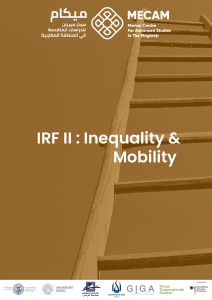
IRF « Inequality & Mobility »
Has a focus on social and economic inequalities, the resulting sense of insecurity, and their role in the (re-)negotiation of visions and models of the future. The IRF specifically explores how distinct forms of disparity (incl. concrete policy decisions) drive or restrain mobility and how in turn, mobility can exacerbate or mitigate inequality;
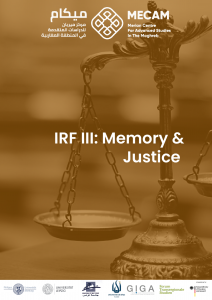
IRF « Memory & Justice »
Discusses legacies of the past, including their legal, political and cultural perceptions and frames in relation to different assessments of the present and to models and (re-)negotiations of the future. Research sheds light on the ways in which differential access to political power shapes questions of accountability, fact-finding, amnesty, judicial reforms, human rights claims and the legitimate sources of law in post-conflict societies and beyond;
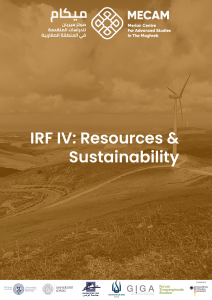
IRF « Resources & Sustainability »
Investigates how societies in general and political decision-makers in particular deal with burgeoning socio-economic disparities and growing environmental problems. This IRF studies which economic models might ensure a politically, socially and ecologically sustainable future. Especially rentier and extractivist economic models in the Maghreb/Middle East are addressed here as these models generate particular forms of disparities and thus also interesting visions of the future;
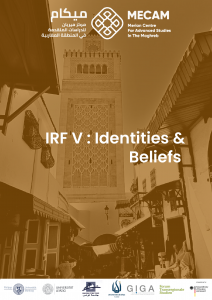
IRF « Identities & Beliefs »
Examines co-existing, sometimes competing identities and belief systems which are partly impacted by political power dynamics. Disparities are felt, perceived and articulated very differently from the vantage point of diverse identities and beliefs, resulting in pluralistic ways of (re-)negotiating imaginations and models of the future. Possible research foci are therefore on topics such as reform-oriented Arab-Muslim thought, the future manifestation of political Islam in the Maghreb but also various of non-religious identities and belief systems.
ELIGIBILITY & MOTIVATION
Applications are welcome from postdoc researchers of all fields in the social sciences and humanities if
- You are interested in discussing your research in the framework of MECAM’s main theme “Imagining futures: Dealing with disparity” with colleagues from the Maghreb, the Middle East, Europe, and other regions of the world.
- You want to engage in collaborative work, in debate and exchange with other researches working on topics related to the five IRFs.
- You are interested in revisiting your research from a different vantage point.
- You want to become part of a (new) network of interdisciplinary, intergenerational, and transregional exchange and debate on disparity and the competing models for the future that co-exist in the societies of the contemporary Maghreb, Europe, and other parts of the world.
OUR OFFER
FELLOWSHIP
Three post-doctoral researchers will be invited as MECAM Fellows on the basis of an evaluation of the quality and originality of their research proposal. Projects should address one or more of the themes sketched out in the IRFs. Fellows are expected to take up residency for up to three years in Tunis, from 1 September 2023 to 31 August 2026. During the period of their residency, Fellows of MECAM gain the freedom to work on their self-chosen individual research projects and the opportunities for exchange in and outside MECAM, with their co-fellows, and colleagues from Tunisia and from MECAM’s networks. Fellows participate in on-site seminars and expected to work regularly at MECAM. They will be invited to formats that support collaborative work and to participate in the academic life of MECAM. While developing their own research, fellows are expected to take up residence in Tunis, present their work to their co-fellows and in close individual coordination with a Tunisian University. Moreover, fellows commit to participate regularly at in-person colloquia, to contribute a monograph and/or edit a collective volume preferably in MECAM’s Book Series as well as to co-organize each year an in-person workshop within the framework of MECAM’s fellow seminar (“MECAM Spectrum”) with the involvement of MECAM’s Principal Investigators working on IRFs and/or external experts. Furthermore, fellows show willingness to take responsibility for the content of the work of MECAM in consultation with the two MECAM directors. The latter is based on individual interests in research and academic exchange on the topics of the IRFs. MECAM will host the selected fellows in Tunis. Only in exceptional cases due to the pandemic, fellowships may be arranged in a hybrid format, where the fellow remains at her/his place of regular residence for a part of the fellowship. Research projects that include field research outside of Tunis or in other locations in Tunisia or the Maghreb, are to be designed in such a way that the field research takes place during the time when there are no fellow cohorts present at MECAM (September-April). Successful applicants will become ‘MECAM fellows’ with all relevant rights and obligations: Travel and relocation costs will be compensated according to a “no gain/no loss” principle. Furthermore, proven research costs can be reimbursed up to a total amount of 2000 EUR for the three years. A monthly stipend will be awarded for the duration of the fellowship according to the “no gain/no loss” principle.
NETWORK
MECAM Fellows will become part of a network, which will be built up by subsequent groups of fellows over the next years, and by the scholars of the institutions that are involved in the institutional framework. MECAM and its partner institutions offer networking and publication opportunities via specific networks, formats and support.
EXCHANGE AND DEBATE
The primary aim of MECAM is to create a high-quality and flexible setting for peer-to-peer exchange and debate between researchers from different countries, disciplines, and in different phases of their academic career: The fellowship combines virtual and in-person forms of exchange and debate, and facilitates collaboration and engagement with scholars at MECAM partner institutions, students, and the wider public. MECAM’s directors and the coordination office in Tunis will support the fellows during their stay at MECAM. Part of MECAM’s academic life is its fellow seminar (“MECAM Spectrum”) in which Fellows present their work to the other Fellows, a seminar where they can invite guests from outside MECAM. MECAM’s partners offer further opportunities for publication and exchange.
INDEPENDENCE
MECAM fellows are free to pursue their individual research projects in the form they choose, be it an academic article, an essay, a policy paper, a book, a report, etc. Projects can have particular components of field or archive research (in Tunis, and/or a neighbouring state in the Maghreb if the duration does not conflict in principle with the obligation for residence).
SUPPORT
MECAM provides its fellows with shared office workspaces as well as publication facilities for open-access and peer-reviewed formats of publication through the infrastructures of MECAM and its partners. It offers logistical support with travel, accommodation and field research in Tunisia. Moreover, the exchange between fellows is supported by a secure digital workspace (TrafoHub) and other digital tools.
YOUR APPLICATION
MECAM assigns its partner institution, Forum Transregionale Studien in Berlin, with the processing of personal application data. Therefore, we kindly ask you to submit your application via the secure online application platform of the Forum Transregionale Studien by 31 Mai 2023, 12.30h CEST.:
application.trafo-berlin.de
Applications by email will not be considered. If you have any questions, please do not hesitate to contact MECAM’s coordination team: mecam-office@uni-marburg.de
|
As part of your application, you will be asked to prepare and upload:
|
MECAM kindly requests that applications are submitted in English or French. MECAM’s working languages are English, French and Arabic. Applicants should be able to communicate in at least two of these languages, with a desirable ability to publish and present research in more than one working language.
The applications are evaluated by renowned international academics who are members of MECAM’s International Advisory Board. All applicants will be informed of the outcome of the selection process in June 2023. The main selection criteria are academic merit, thematic and regional expertise, overall motivation, the quality of the proposed innovative research related to the thematic frame of the IRFs, and language proficiency.
Interregionalism, interdisciplinarity, and intergenerationality will be reflected in the fellowships: We therefore welcome academic cooperation between researchers from Germany, Tunisia, from the wider North African and Middle Eastern region, and the international academic community. We also want to promote diversity through interdisciplinary perspectives from various social science and humanities disciplines and contribute to strengthening academic cooperation between leading academics and young researchers. The latter is intended to help younger academics to integrate into research structures and thus build up sustainable interregional networks.
MECAM is closely monitoring the impact of the coronavirus pandemic, but is currently planning to maintain the fellowship as announced in this Call for Applications.
INSTITUTIONAL FRAMEWORK – WHAT IS MECAM?
The “Merian Centre for Advanced Studies in the Maghreb” (MECAM) was founded as an international centre for interdisciplinary research and academic exchange. It is located at the Université de Tunis/Tunisia. MECAM is a joint endeavour of a consortium of renowned Tunisian and German research institutions: It is coordinated by the Philipps-Universität Marburg and the Université de Tunis and supported by the Universität Leipzig, the German Institute for Global and Area Studies (GIGA) in Hamburg/Germany, the Forum Transregionale Studien in Berlin/Germany and the University of Sfax/Tunisia. During a three-year preliminary phase (2020-2023), this consortium is entrusted with the institutional development of MECAM and the preparation of the project’s main phase (2023-2029).
MECAM’s partner institutions:
- Philipps-Universität Marburg, Marburg: Philipps-Universität Marburg, Marburg: The Philipps-Universität Marburg, with its 25,000 students, has a research focus on the Area Studies, which is reflected for instance in the Center for Near and Middle Eastern Studies (CNMS). The CNMS is involved in MECAM, alongside other interdisciplinary institutions and departments, including the Centre for Conflict Studies, the Department of History and Cultural Studies, the Institutes of Media Studies and Romance Philology, and the Department of Mathematics and Computer Science.
- Université de Tunis, Tunis: The Université de Tunis was founded in 1960 and is today, with some 20,000 students, one of the largest universities in Tunisia, boasting a wide-ranging research and teaching portfolio with an outstanding reputation for research excellence across the region.
- Universität Leipzig, Leipzig: The Universität Leipzig is a German university with around 30.000 students. Within the MECAM institutional structure the University is represented by the Institute of Geography, the Institute for Oriental Studies, and the Small Enterprise Training Program (SEPT). The Institute of Geography’s regional focus is the Mediterranean region.
- German Institute for Global and Area Studies (GIGA), Hamburg: GIGA is an independent research institute based in Hamburg, Germany, which conducts research on politics, economics, and society in Africa, Asia, Latin America, and the Middle East as well as on global issues. Within MECAM, the GIGA Institute for Middle East Studies (IMES) is particularly involved.
- Forum Transregionale Studien, Berlin: The Forum Transregionale Studien is a platform that promotes the internationalization of research in the humanities and social sciences. It enables collaboration among researchers with different disciplinary backgrounds and awards fellowships to researchers from all over the world.
- Université de Sfax, Sfax: The Université de Sfax is located in Tunisia’s second largest city and important economic centre in the south of the country. It is attended by 35,000 students.
The Federal Ministry of Education and Research of Germany supports and funds the establishment of the international centre for research in the Humanities and Social Sciences.
The Université de Tunis provides the infrastructure for the installation of MECAM in Tunis, including the premises and complementary resources, within the Institut Supérieur des Etudes Appliquées en Humanités (ISEAHT) de Tunis.
For further information on MECAM, please visit:

